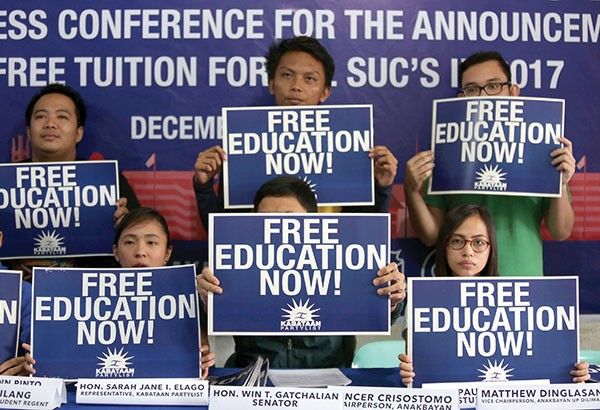YearEnder: Power struggle hounds CHED; free tuition, ROTC pushed

MANILA, Philippines – The past year had been a rollercoaster ride for Commission on Higher Education (CHED) Chairman Patricia Licuanan, an appointee of the previous administration who is expected to take charge of implementing the policies of the new government.
In his first State of the Nation Address, President Duterte immediately pushed for the re-imposition of the mandatory Reserve Officers’ Training Corps (ROTC) program for college students, saying this will strengthen the love of Filipinos for their country.
With Duterte actively working on the war on drugs, the conduct of mandatory drug testing as a requirement for entry and retention in higher education institutions was also proposed and is currently under consideration.
Various stakeholders also urged the new administration to act on the rising cost of school fees, resulting in a last-minute realignment of P8.3 billion to remove tuition in state universities and colleges (SUCs) in 2017.
But for Licuanan, the biggest challenge she faced this year did not involve any of the new higher education policy directives of the Duterte government.
Even before the new administration took over on June 30, Licuanan’s mandate was put to test after a former professor of the then-president-elect claimed he was promised the CHED chairmanship.
In an open letter to Duterte, former Lyceum of the Philippines University (LPU) professor Jose David Lapuz reminded his former student of the designation during a meeting “in a room full of your many visitors and admirers.”
But unlike other Cabinet secretaries whose appointments are co-terminus with the sitting president, Licuanan was quick to clarify that she has a fixed term that will end in 2018.
Under the Higher Education Act of 1994, CHED chairpersons are to serve a fixed term of four years, with a possibility of one re-appointment. Licuanan was appointed by former president Benigno Aquino III in 2010 and was reappointed to a second and final term in 2014.
She later disclosed that in a meeting with Duterte after the elections, the then president-elect re-assured her that he would respect her term.
Her mandate as CHED chief further solidified when the President allowed her to attend Cabinet meetings in Malacañang.
She also co-headed the Education Summit in November, along with Education Secretary Leonor Briones and Technical Education and Skills Development Authority director-general Guiling Mamondiong, both of whom are appointees of the new President.
Disinvited from Cabinet meetings
The dust barely settled when Licuanan, on Dec. 4, received a text message from Cabinet Secretary Leoncio Evasco Jr. directing her to desist from attending Cabinet meetings as per order of Duterte.
The text message she received was similar to the one sent to Vice President Leni Robredo, who immediately resigned as chair of the Housing and Urban Development Coordinating Council.
But unlike Robredo, Licuanan said she would continue to function as CHED chair as she assured Evasco that she would follow the wishes of the President.
She noted that previous CHED chairpersons were able to fulfill their mandate despite not being part of the official family of the sitting chief executive.
Malacañang said the desist order was due to irreconcilable differences between Duterte and Licuanan, who expressed surprise and maintained that she has always followed the policy directives of the President.
The desist order revived calls for Licuanan to resign from her post, the most prominent of which came from CHED executive director Julito Vitriolo, the highest ranking career executive at the agency.
Accusing Licuanan of gross insubordination and undermining the CHED chairmanship, Vitriolo wrote to Duterte and asked him to appoint an officer-in-charge who will act as his alter ego at the commission.
He recommended commissioner J. Prospero de Vera, the President’s first appointee at CHED.
De Vera distanced himself from the leadership row and denied allegations that he was the one spearheading the move to oust Licuanan.
Duterte has since appointed former representative Ronald Adamat, who served as sectoral congressman for cultural communities from 1995 to 1998, as one of the four CHED commissioners.
Also part of the five-member body chaired by Licuanan are commissioners Alex Brillantes and Minella Alarcon, whose courtesy resignations have yet to be acted upon by Malacañang.
Free tuition, ROTC revival
With Licuanan resolved on finishing her term, she will be among those responsible in implementing the higher education policy directives of the new administration.
Among these are the implementation of free tuition in SUCs, the proposal to revive mandatory ROTC and the possible conduct of drug testing on college students.
Initially apprehensive of removing tuition as it may result in massive migration of students from private colleges to state-funded tertiary institutions, Licuanan recently pledged to work with the Department of Budget and Management to ensure that the new policy will be properly implemented.
The P8.3-billion allocation to remove tuition came from the supposed infrastructure budget for the Autonomous Region in Muslim Mindanao, which Sen. Panfilo Lacson dubbed as a form of pork barrel.
To break the deadlock, lawmakers decided to allot the budget to remove tuition in SUCs.
CHED said it would work on the guidelines on how to allocate the funds to 114 academic institutions, including the University of the Philippines System.
Education advocates lauded the budget allocation and called for the institutionalization of the policy by passing the pending Free Higher Education bills in Congress.
Meanwhile, Licuanan also formed a technical working group to review the proposal to re-impose mandatory ROTC.
In one interview, however, she stressed that a law is necessary to implement this directive of the President as the existing National Service Training Program has to be amended or repealed.
The Department of National Defense is reportedly drafting a bill that will require ROTC in senior high school, instead of college.
Various students groups led by the Kabataan party-list criticized the proposal, stressing that the program will not promote patriotism but a culture of harassment and violence among the youth.
The matter is expected to be taken up in the next Congress.
Meanwhile, Licuanan said they have sought the opinion of Department of Justice if they can implement the proposal to conduct mandatory drug tests for college students.
The Samahan ng Progresibong Kabataan opposed the proposal, saying it will promote a discriminatory and skewed approach to solving the drug problem in the country.
- Latest
- Trending































